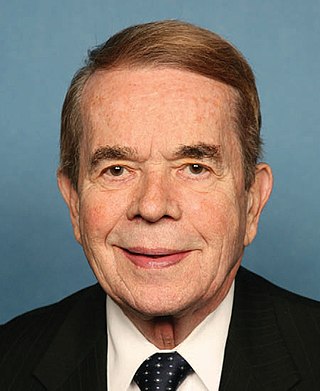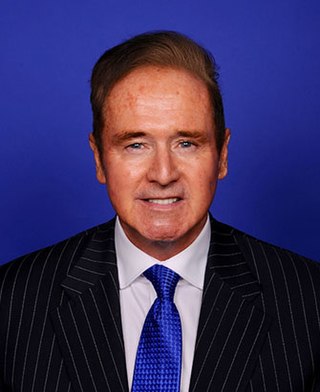
Lucille Elsa Roybal-Allard is an American politician who served as a U.S. representative from California from 1993 to 2023. A member of the Democratic Party, she first entered Congress in 1993. Her district, numbered as the 33rd until 2003, the 34th from 2003 to 2013, and the 40th from 2013 to 2023, included much of southern Los Angeles, as well as several eastern suburbs, such as Downey, Bell and Bell Gardens. On December 20, 2021, Roybal-Allard announced her retirement at the end of the 117th Congress.

The United States House Committee on Appropriations is a committee of the United States House of Representatives that is responsible for passing appropriation bills along with its Senate counterpart. The bills passed by the Appropriations Committee regulate expenditures of money by the government of the United States. As such, it is one of the most powerful committees, and its members are seen as influential.

The Committee on Rules, or more commonly, the Rules Committee, is a committee of the United States House of Representatives. It is responsible for the rules under which bills will be presented to the House of Representatives, unlike other committees, which often deal with a specific area of policy. The committee is often considered one of the most powerful committees as it influences the introduction and process of legislation through the House. Thus it has garnered the nickname the "traffic cop of Congress". A rule is a simple resolution of the House of Representatives, usually reported by the Committee on Rules, to permit the immediate consideration of a legislative measure, notwithstanding the usual order of business, and to prescribe conditions for its debate and amendment.

The Committee on Ways and Means is the chief tax-writing committee of the United States House of Representatives. The committee has jurisdiction over all taxation, tariffs, and other revenue-raising measures, as well as a number of other programs including Social Security, unemployment benefits, Medicare, the enforcement of child support laws, Temporary Assistance for Needy Families, foster care, and adoption programs. Members of the Ways and Means Committee are not allowed to serve on any other House Committee unless they are granted a waiver from their party's congressional leadership. It has long been regarded as the most prestigious committee of the House of Representatives.

Dale Edward Kildee was an American politician who served as U.S. Representative of Michigan from 1977 to 2013. He was a member of the Democratic Party.

The 99th United States Congress was a meeting of the legislative branch of the United States federal government, composed of the United States Senate and the United States House of Representatives. It met in Washington, D.C., from January 3, 1985, to January 3, 1987, during the fifth and sixth years of Ronald Reagan's presidency. The apportionment of seats in the House of Representatives was based on the 1980 United States census.

The U.S. House Committee on the Judiciary, also called the House Judiciary Committee, is a standing committee of the United States House of Representatives. It is charged with overseeing the administration of justice within the federal courts, federal administrative agencies, and federal law enforcement entities. The Judiciary Committee is often involved in the impeachment process against federal officials. Because of the legal nature of its oversight, committee members usually have a legal background, but this is not required.

The U.S. House Committee on Transportation and Infrastructure is a standing committee of the United States House of Representatives.

Eddie Bernice Johnson is an American politician who represented Texas's 30th congressional district in the United States House of Representatives from 1993 to 2023. Johnson is a member of the Democratic Party.

The 93rd United States Congress was a meeting of the legislative branch of the United States federal government, composed of the United States Senate and the United States House of Representatives. It met in Washington, D.C., from January 3, 1973, to January 3, 1975, during the last 18 months of Richard Nixon's presidency, and the first 6 months of Gerald Ford's. This Congress was the first Congress with more than two Senate presidents. After the resignation of Spiro Agnew, Gerald Ford was appointed under the authority of the newly ratified 25th Amendment. Ford became president the next year and Nelson Rockefeller was appointed in his place. The apportionment of seats in the House of Representatives was based on the 1970 United States census. Both chambers had a Democratic majority. This is the earliest Congress to feature a member of the 117th Congress, Representative Don Young (R-AK), who served until he died in 2022.

Brian Michael Higgins is an American politician serving as the U.S. representative for New York's 26th congressional district, serving since 2005. The district, numbered as the 27th district from 2005 to 2013 but as the 26th since 2013, includes Buffalo and Niagara Falls. Following the 2022 redistricting process, the district now stretches up to Lake Ontario, taking in all or parts of seven additional towns in Niagara County. Higgins is a member of the Democratic Party, and of several congressional committees and caucuses. He was born, raised, and graduated from college in Buffalo, later obtaining graduate degrees from Buffalo State College and Harvard University.

The 92nd United States Congress was a meeting of the legislative branch of the United States federal government, composed of the United States Senate and the United States House of Representatives. It met in Washington, D.C., from January 3, 1971, to January 3, 1973, during the third and fourth years of Richard Nixon's presidency.

The standing Committee on Veterans' Affairs in the United States House of Representatives oversees agencies, reviews current legislation, and recommends new bills or amendments concerning U.S. military veterans. Jurisdiction includes retiring and disability pensions, life insurance, education, vocational training, medical care, and home loan guarantees. The committee oversees the Department of Veterans Affairs (VA), veterans' hospitals, and veterans' cemeteries, except cemeteries under the Secretary of the Interior.

The U.S. House Committee on Homeland Security is a standing committee of the United States House of Representatives. Its responsibilities include U.S. security legislation and oversight of the Department of Homeland Security.

The Committee on Energy and Commerce is one of the oldest standing committees of the United States House of Representatives. Established in 1795, it has operated continuously—with various name changes and jurisdictional changes—for more than 200 years. The two other House standing committees with such continuous operation are the House Ways and Means Committee and the House Rules Committee. The committee has served as the principal guide for the House in matters relating to the promotion of commerce and to the public's health and marketplace interests, with the relatively recent addition of energy considerations among them. Due to its broad jurisdiction, it is considered one of the most powerful committees in the House.

The Committee on Oversight and Accountability is the main investigative committee of the United States House of Representatives.
The Permanent Subcommittee on Investigations (PSI), stood up in March 1941 as the "Truman Committee," is the oldest subcommittee of the United States Senate Committee on Homeland Security and Governmental Affairs.

John Emerson Moss was an American politician of the Democratic Party, noted for his championing of the federal Freedom of Information Act (FOIA) through multiple sessions of the United States House of Representatives where he served from 1953 to 1978.

Frederick Carlyle Boucher is an American politician who was the U.S. representative for Virginia's 9th congressional district from 1983 to 2011. He is a member of the Democratic Party. He was defeated in his bid for a 15th term by Republican Morgan Griffith in the 2010 elections.








